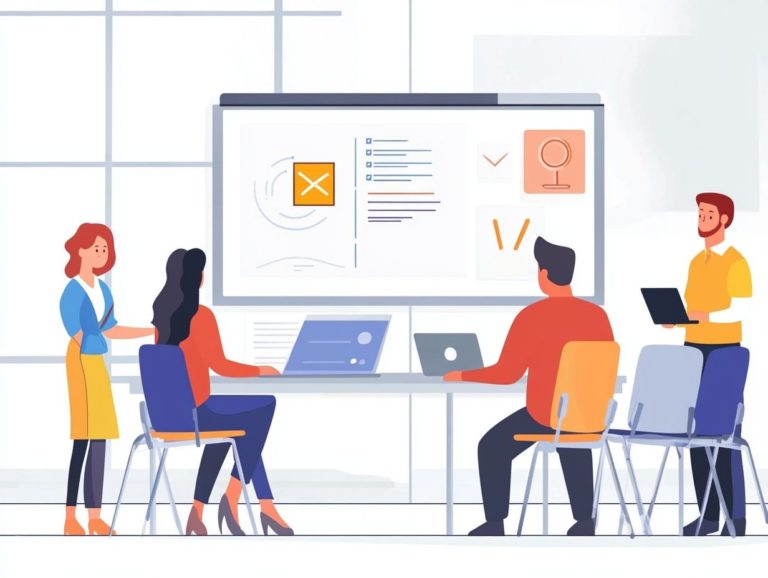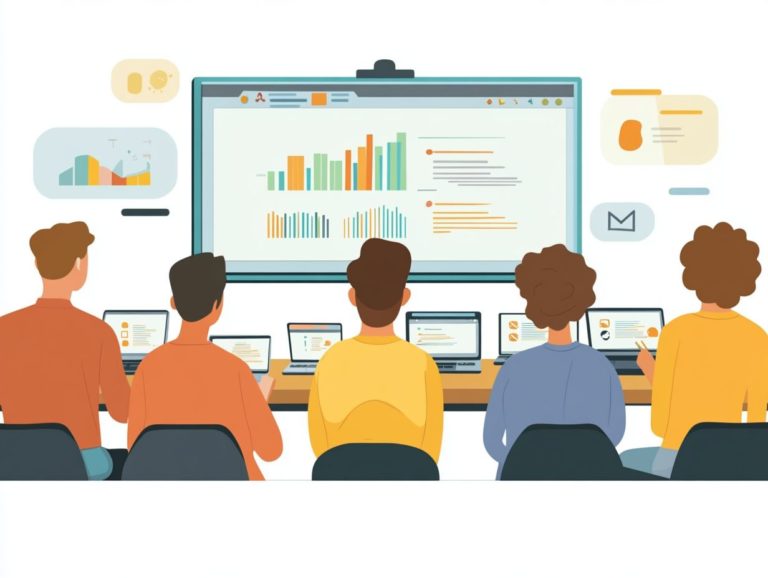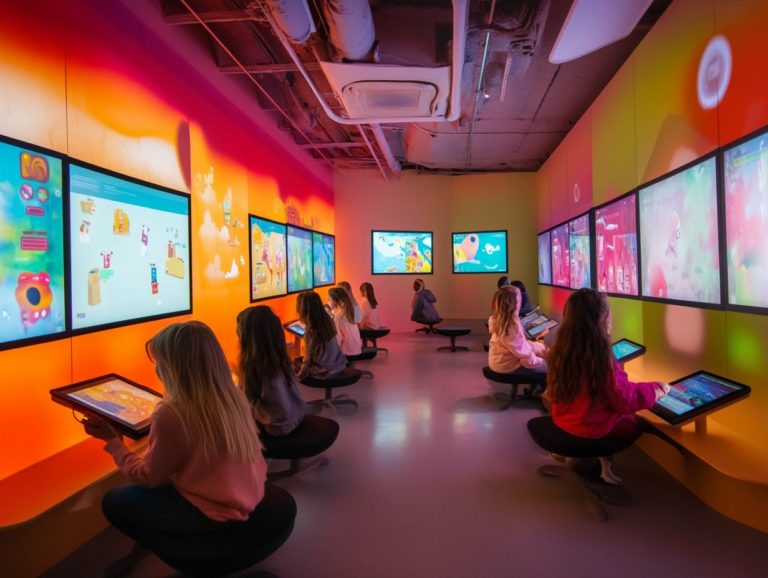How E-Learning Enhances Knowledge Retention
E-learning has revolutionized the field of education and training, presenting innovative avenues to acquire knowledge and skills.
With its numerous benefits such as enhanced knowledge retention, unparalleled flexibility, and cost-effectiveness it has emerged as the favored choice for learners around the globe. This article delves into the essence of e-learning, outlining its advantages and illustrating how it boosts knowledge retention through interactive and personalized approaches.
You’ll discover best practices for implementing e-learning effectively while also gaining insights into the exciting future that technological advancements are shaping.
Contents
- Key Takeaways:
- Understanding E-Learning
- The Benefits of E-Learning
- How E-Learning Enhances Knowledge Retention
- Implementing E-Learning in Education and Training
- The Future of E-Learning
- Frequently Asked Questions
- How does e-learning enhance knowledge retention?
- What are the benefits of e-learning for knowledge retention?
- Can e-learning be used for all types of learning?
- Are there any specific techniques used in e-learning to enhance knowledge retention?
- How does e-learning compare to traditional classroom learning in terms of knowledge retention?
- Can e-learning enhance long-term retention of knowledge?
Key Takeaways:

- E-learning improves knowledge retention through interactive learning methods, personalized experiences, and continuous learning opportunities.
- It offers flexibility and accessibility, making it a cost-effective option for education and training.
- To ensure successful implementation, engage and motivate learners with best practices and utilize technological advancements for a better learning experience in the future.
Understanding E-Learning
Understanding E-Learning means appreciating its important role in contemporary education, as it meets the varied needs of different learners, including adults seeking flexible and accessible training solutions.
As someone who creates educational programs, you will find yourself navigating the intricate landscape of knowledge retention while grappling with the challenges of the digital age. Traditional methods often miss the mark, so you will need to employ innovative approaches to effectively assess training needs and deliver impactful learning experiences.
What is E-Learning?
E-learning is a sophisticated digital learning approach that leverages technology to enhance your educational experiences. It allows you to engage with content in a flexible format that significantly boosts knowledge retention.
This innovative model encompasses various formats, such as online courses that provide structured modules you can navigate at your own pace, and webinars that facilitate real-time interaction with instructors and fellow learners. Interactive simulations offer immersive experiences, deepening your understanding through practical application. Each format is thoughtfully designed to accommodate diverse learning styles, ultimately fostering improved knowledge retention.
By recognizing the strengths of these approaches, you not only acquire new information but also learn to apply it effectively in real-world contexts. This ensures that your learning experience is not just enriching but also impactful.
The Benefits of E-Learning
E-learning offers fantastic benefits that can transform your educational journey! You will likely find that improved knowledge retention comes naturally through active learning techniques.
The enhanced flexibility lets you tailor your studies to fit your lifestyle, while the greater accessibility to educational resources means you can learn anytime and anywhere, free from the limitations of traditional settings.
Improved Knowledge Retention
Improved knowledge retention in e-learning is within your reach through strategies like spaced repetition (a technique that involves reviewing material over increasing intervals of time) and active recall, meticulously designed to enhance cognitive processing and ensure effective information storage in your mind.
Incorporating techniques such as microlearning and interactive simulations can significantly elevate your learning experience. Microlearning breaks down complex topics into manageable, bite-sized modules, allowing you to engage with content in short, focused sessions that are much easier to digest.
For instance, educational platforms have discovered that learners like you retain up to 80% more information when utilizing these concise materials an insight supported by various studies in educational psychology.
Interactive simulations provide a hands-on approach, immersing you in realistic scenarios that encourage active participation, fostering a deeper understanding and retention of knowledge. Research indicates that such experiential learning methods not only captivate participants but also lead to higher rates of skill application in real-world situations.
Are you ready to explore the world of e-learning?
Flexibility and Accessibility

Flexibility and accessibility are hallmark advantages of e-learning. They allow you to customize your educational journey to fit your schedule and learning style. In a world overflowing with information, this approach helps you navigate the complexities of the digital age.
This adaptability becomes particularly advantageous when you re juggling professional commitments, family responsibilities, or personal projects. Consider platforms that offer asynchronous learning, which means you can study on your own schedule; they empower you to engage with course materials at your own pace.
Whether you’re watching recorded lectures in the quiet of the night or tackling assignments during your lunch break, the choice is yours. With mobile access, you can effortlessly switch between devices. This makes studying during your commute or while waiting for appointments easy.
This convenience not only makes studying easier but also supercharges your engagement! It seamlessly integrates education into your busy life, giving you the power to embrace lifelong learning with both ease and efficiency.
Cost-Effectiveness
The cost-effectiveness of e-learning solutions is clear; they provide top-notch training programs while significantly slashing the expenses tied to traditional education. This gives you the power to invest more in your skill development.
With this modern approach, you can kiss those travel costs goodbye no more commuting to physical locations, which means substantial savings over time. According to a study by Ambient Insight Research, organizations can save an impressive 50-70% on training costs when they choose e-learning.
These savings extend to materials, which can often be eliminated or reduced in digital formats. Businesses embracing online training have reported retention rate increases of up to 60%, demonstrating that e-learning is not just more affordable, but also delivers more effective outcomes.
Such compelling statistics shed light on why many educational institutions and corporations are making the shift to online platforms.
How E-Learning Enhances Knowledge Retention
E-learning significantly boosts knowledge retention by employing a variety of effective strategies. Understanding how social learning enhances e-learning engages you through interactive learning methods that capture your attention and make the material more enjoyable.
Personalized learning experiences cater to your unique needs, ensuring you grasp concepts at your own pace. Continuous learning opportunities further reinforce your understanding, enhancing how well you understand and remember information over time.
Interactive Learning Methods
Interactive learning methods in e-learning, such as role-play scenarios and collaborative activities, are essential for keeping you engaged and reducing cognitive overload. These techniques boost your knowledge retention.
They prompt you to actively participate and create a sense of community among your peers, transforming the educational experience into something more enjoyable and effective.
For instance, consider the implementation of gamified learning in corporate training programs; these approaches have been shown to keep participants motivated and focused. Take the case of a financial services firm that adopted a role-playing strategy for its customer service training, resulting in a remarkable 30% improvement in customer satisfaction scores.
Similarly, collaborative projects in online classrooms yield impressive outcomes. One university noted enhanced teamwork skills and a deeper understanding of course material among students who participated in peer-to-peer learning.
Through these interactive methods, educators can significantly elevate your overall learning experience.
Embrace the future of learning today and unlock your potential with e-learning!
Personalized Learning Experiences
Personalized learning experiences are designed to cater to your unique needs, addressing any knowledge gaps while boosting your engagement through tailored content that resonates with you as an adult learner.
To effectively craft these personalized experiences, you can leverage tools like reflection diaries and ongoing assessments. These tools allow you to express your thoughts and track your own progress. For instance, by keeping a reflection diary, you can pinpoint your strengths and weaknesses, guiding the instructional process in a way that works for you.
Formative assessments provide valuable feedback, enabling instructors to tweak the curriculum to better suit your learning journey. This adaptable approach not only deepens your understanding but also fosters a sense of autonomy, making your learning experience more relevant and impactful. Ultimately, these strategies highlight the importance of creating educational experiences that honor your unique journey as an adult learner.
Continuous Learning Opportunities

Continuous learning is essential! It lets you revisit material and engage in spaced learning, which helps you remember information longer through practice sessions that reinforce your knowledge retention over time.
This approach deepens your understanding and encourages you to apply skills in real-world scenarios. Modern educational methodologies highlight a learning approach that adjusts based on what you know, enabling you to customize your study path according to your strengths and weaknesses.
E-learning platforms like Coursera and Udemy incorporate techniques such as gamification, which uses game-like elements in learning, and interactive simulations. Transforming learning into an engaging and enjoyable experience!
The immediate access to a wide array of resources gives you the power to monitor your progress, receive instant feedback, and collaborate with peers from around the globe. Ongoing engagement is crucial for your growth, especially in rapidly changing industries, enhancing your professional development and career growth.
Implementing E-Learning in Education and Training
Implementing e-learning in education and training demands careful planning and a commitment to best practices that resonate with methods that help create effective learning experiences. By doing so, you empower learners and effectively address their training needs assessments, ensuring a more impactful educational experience.
Best Practices for Successful Implementation
Best practices for successfully implementing e-learning require a deep understanding of instructional design that emphasizes learner engagement and aligns seamlessly with the goals of your training programs.
By embracing user-centric design principles, you can craft courses that truly resonate with your learners and cater to their specific needs. Iterative feedback loops are vital in this process, allowing you to continuously refine your content based on learner input and performance data.
For example, a case study featuring a corporate e-learning initiative highlighted substantial improvements in retention rates when regular assessments and adaptive learning pathways, tailored to individual progress, were introduced. Utilizing evaluation methods like analytics tools can help you identify trends and pinpoint areas for enhancement, ensuring that your learning environment remains dynamically and evolves in tandem with its participants.
Embrace e-learning today and transform your learning experiences for a brighter future!
Tips for Engaging and Motivating Learners
Engaging and motivating you as a learner in e-learning environments can be achieved through various strategies, including collaborative activities, interactive course discussions, and thoughtful feedback mechanisms.
These techniques cultivate a sense of community among learners and encourage your participation and peer learning. These are essential elements for fostering deep understanding. For example, engaging in discussion forums where you can share insights or pose questions creates a vibrant learning atmosphere.
You can boost your motivation by using fun elements like earning badges or tracking your progress. A recent case study revealed that an online platform achieved a remarkable 30% increase in retention rates after adopting these engagement-focused strategies.
By integrating these elements into your e-learning experience, you can enjoy a more dynamic and supportive environment that enhances your overall learning journey.
The Future of E-Learning
Get ready! The future of e-learning is transforming in amazing ways, driven by continuous technological advancements. These innovations reshape the way knowledge is delivered and enable novel methods for applying that knowledge, elevating the digital learning experience to unprecedented heights.
Technological Advancements and Potential Impact

Technological advancements in e-learning present remarkable opportunities for you to enhance knowledge retention and boost learner engagement. They reshape educational practices to meet the demands of the digital age.
This evolution is particularly clear in the rise of AI-driven personalization, where AI means computers that learn from your behavior to create a tailored experience. Algorithms analyze your learning behavior to tailor content specifically to your needs. For instance, platforms like Coursera have embraced these features, allowing you to pursue custom learning paths that align perfectly with your goals.
Immersive learning technologies, such as virtual reality (VR) and augmented reality (AR), are revolutionizing traditional teaching methods. They offer interactive experiences that promote a deeper understanding. A striking example is the use of VR in medical education, enabling students to engage in simulated surgeries, significantly enhancing their skills and confidence.
These advancements elevate engagement and lead to improved learning outcomes. This marks a significant transformation in how knowledge is delivered and retained.
Frequently Asked Questions
How does e-learning enhance knowledge retention?
E-learning enhances knowledge retention through its interactive and engaging nature. By incorporating multimedia elements such as videos, quizzes, and games, learners are more likely to retain the information presented, making using e-learning for employee retention strategies an effective approach.
What are the benefits of e-learning for knowledge retention?
E-learning makes learning enjoyable and allows for personalized learning experiences and immediate feedback. Both contribute to better retention of information.
Can e-learning be used for all types of learning?
Yes, e-learning can be used for a wide range of learning objectives and topics, from basic skills training to complex concepts. Its versatility allows for various learning methods to enhance knowledge retention.
Are there any specific techniques used in e-learning to enhance knowledge retention?
Yes, e-learning employs various techniques such as spaced repetition, chunking, and microlearning. These methods have been proven to improve retention rates and make learning more effective.
How does e-learning compare to traditional classroom learning in terms of knowledge retention?
E-learning has been found to be just as effective, if not more, than traditional classroom learning when it comes to knowledge retention. By maximizing learning with e-learning solutions, its interactive and personalized nature makes it an ideal tool for enhancing retention rates.
Can e-learning enhance long-term retention of knowledge?
Yes, with techniques such as spaced repetition and reinforcement, e-learning can help learners retain information long-term. It also allows for easy access to review materials, further reinforcing retention.






